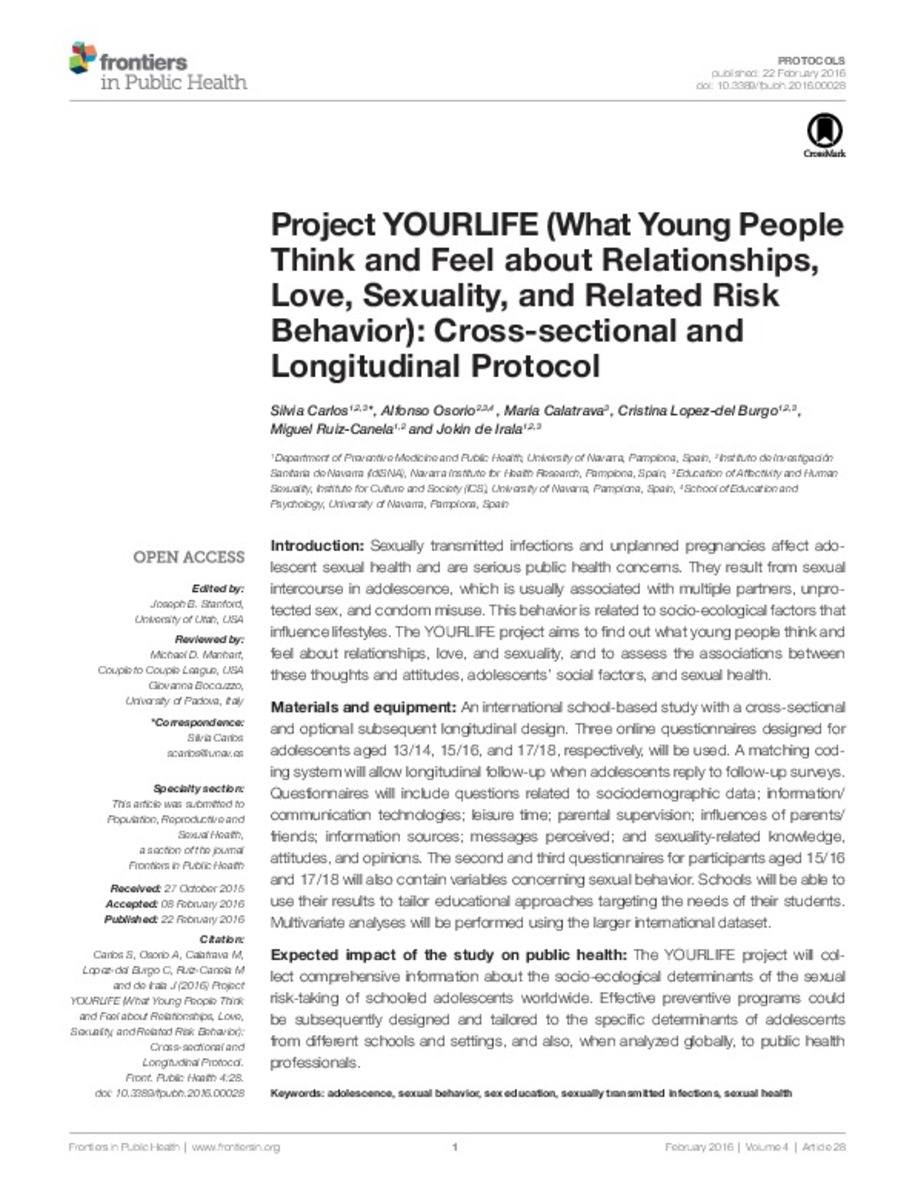Full metadata record
| DC Field | Value | Language |
|---|---|---|
| dc.creator | Carlos-Chillerón, S. (Silvia) | - |
| dc.creator | Osorio, A. (Alfonso) | - |
| dc.creator | Calatrava, M. (María) | - |
| dc.creator | Lopez-del-Burgo, C. (Cristina) | - |
| dc.creator | Ruiz-Canela, M. (Miguel) | - |
| dc.creator | Irala, J. (Jokin) de | - |
| dc.date.accessioned | 2016-02-29T11:20:03Z | - |
| dc.date.available | 2016-02-29T11:20:03Z | - |
| dc.date.issued | 2016-02-22 | - |
| dc.identifier.citation | Carlos S, Osorio A, Calatrava M, Lopez-del Burgo C, Ruiz-Canela M and de Irala J (2016) ""Project YOURLIFE (What Young People Think and Feel about Relationships, Love, Sexuality, and Related Risk Behavior): Cross-sectional and Longitudinal Protocol"". Front. Public Health 4:28. | es_ES |
| dc.identifier.uri | https://hdl.handle.net/10171/40088 | - |
| dc.description.abstract | Sexually transmitted infections and unplanned pregnancies affect adolescent sexual health and are serious public health concerns. They result from sexual intercourse in adolescence, which is usually associated with multiple partners, unprotected sex, and condom misuse. This behavior is related to socio-ecological factors that influence lifestyles. The YOURLIFE project aims to find out what young people think and feel about relationships, love, and sexuality, and to assess the associations between these thoughts and attitudes, adolescents’ social factors, and sexual health. Materials and equipment: An international school-based study with a cross-sectional and optional subsequent longitudinal design. Three online questionnaires designed for adolescents aged 13/14, 15/16, and 17/18, respectively, will be used. A matching coding system will allow longitudinal follow-up when adolescents reply to follow-up surveys. Questionnaires will include questions related to sociodemographic data; information/communication technologies; leisure time; parental supervision; influences of parents/friends; information sources; messages perceived; and sexuality-related knowledge, attitudes, and opinions. The second and third questionnaires for participants aged 15/16 and 17/18 will also contain variables concerning sexual behavior. Schools will be able to use their results to tailor educational approaches targeting the needs of their students. Multivariate analyses will be performed using the larger international dataset. Expected impact of the study on public health: The YOURLIFE project will collect comprehensive information about the socio-ecological determinants of the sexual risk-taking of schooled adolescents worldwide. Effective preventive programs could be subsequently designed and tailored to the specific determinants of adolescents from different schools and settings, and also, when analyzed globally, to public health professionals. | es_ES |
| dc.language.iso | eng | es_ES |
| dc.rights | info:eu-repo/semantics/openAccess | es_ES |
| dc.subject | Adolescence | es_ES |
| dc.subject | Sexual behavior | es_ES |
| dc.subject | Sex education | es_ES |
| dc.subject | Sexually transmitted infections | es_ES |
| dc.subject | Sexual health | es_ES |
| dc.subject | Materias Investigacion::Ciencias de la Salud | es_ES |
| dc.title | Project YOURLIFE (What Young People Think and Feel about Relationships, Love, Sexuality, and Related Risk Behavior): Cross-sectional and Longitudinal Protocol | es_ES |
| dc.type | info:eu-repo/semantics/article | es_ES |
| dc.identifier.doi | http://dx.doi.org/10.3389/fpubh.2016.00028 | es_ES |
Files in This Item:
Statistics and impact
Items in Dadun are protected by copyright, with all rights reserved, unless otherwise indicated.






